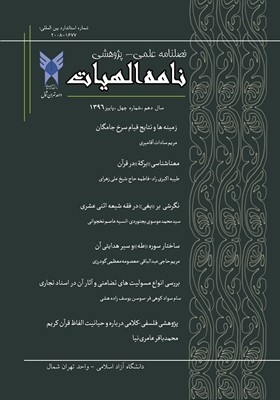شؤون فقیه و ولایت فقیه در نگاه شیخ جعفر کاشف الغطا
محورهای موضوعی : نامه الهیات
1 - استادیار دانشگاه آزاد اسلامی واحد تهران شمال
کلید واژه: حکومت, اندیشه سیاسی, ولایت فقیه, فتحعلی شاه قاجار, شیخ جعفر کاشف الغطا, علمای عصر قاجار,
چکیده مقاله :
تفکر سیاسی همواره در حوزة فقه حکومتی اسلام مطرح بوده و فقهای اسلام از جمله کاشف الغطا در بخشهای مختلف فقه، به آن پرداختهاند. افزون بر جایگاه علمی و موقعیت اجتماعی، عصر کاشف الغطا در شکلگیری و نفوذ اندیشة سیاسی وی مؤثر بوده است. ازجمله اختیارات و شؤون فقیه در عصر غیبت از نگاه کاشف الغطا، تصدی امر جهاد، اقامه و اجرای حدود، مقام افتا، نصب قاضی و شیخ الإسلام و تولیت خمس و زکات میباشد. ایشان بر اساس همین شؤون، در عرصة سیاست داخلی به دفع خطر اخباریان، و در عرصة سیاست خارجی حکم جهاد و اذن تشکیل سپاه به فتحعلی شاه قاجار داد و او را نائب خود ساخت. وی بنابر اصل عدم ولایت معتقد است مخلوقات در عبودیت با هم برابرند و کسی جز خداوند دارای سلطة حقیقی نیست؛ پس اوامر و نواهی نیز تنها از جانب خداوند یا کسی که منصوب از ناحیة او است، باید صادر شود. مبانی نظری او در کتاب کشف الغطا و سیرة عملى ایشان در اجراى قوانین اجتماعى اسلام، حکایت از پذیرش ولایت عامه فقیه برای نائب عام امام یعنی مجتهد جامع الشرایط دارد. این اثر، علاوه بر بررسی برخی جریانهای تاریخی و سیرة عملی کاشف الغطا، مبتنی بر توصیف و تحلیل آرای سیاسی ایشان، با استفاده از آثار مکتوب وی است.
Political thought has always been in the field of Islamic government jurisprudence and Islamic jurists, including Kashif al-Ghatta, have dealt with it in various sections of jurisprudence. In addition to his scientific status and social status, the era of Kashif al-Ghatta has been influential in the formation and influence of his political thought. Among the powers and duties of the jurist in the age of absence from the point of view of Kashif al-Ghatta, is to take charge of jihad, establish and implement limits, the position of fall, the appointment of a judge and Shaykh al-Islam, and the guardianship of khums and zakat. On the basis of these matters, in the field of domestic policy to ward off the danger of the Akhbaris, and in the field of foreign policy, he ordered jihad and the permission to form the IRGC to Fath Ali Shah Qajar and made him his deputy. According to the principle of non-guardianship, he believes that creatures are equal in worship and no one has true dominion except God; Therefore, commands and prohibitions should be issued only by God or someone appointed by Him. His theoretical foundations in the book Kashf al-Ghatta 'and his practical life in the implementation of the social laws of Islam, indicate the acceptance of the general guardianship of the jurisprudent for the general deputy of the Imam, ie the comprehensive Mujtahid. This work, in addition to examining some historical currents and the practical life of Kashif al-Ghatta, is based on the description and analysis of his political views, using his written works.
_||_

